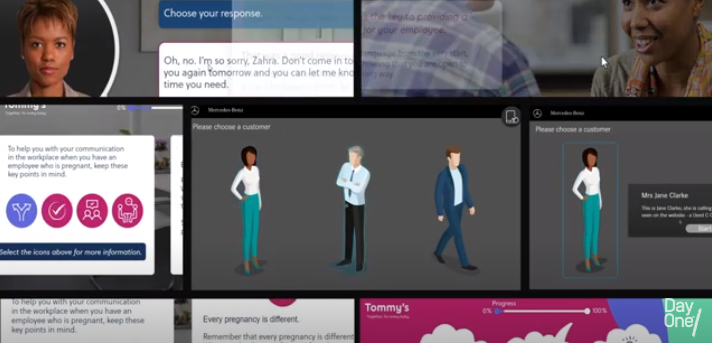Here we offer a guide to creating scenario based learning that works, along with interactive elearning examples from projects with our clients.
Here at Day One in West Yorkshire, UK, we have over 25 years’ experience combining learning psychology with the latest in training technology. Having created engaging, scenario based elearning for some of the world’s best-known brands, we’re well-placed to offer useful insights.

What is Scenario Based Learning?
Scenario based learning (SBL) is an education and training methodology based on the principle that we learn and retain new knowledge and skills better when applied in real-world contexts.
By navigating through various scenarios, learners engage in deep analytical thinking, enhancing their comprehension, memory, and ability to recall.
For a long time, Learning and Development (L&D) departments focused on imparting facts to be memorised – ie learning by rote. However, this method is misguided. It’s not merely about knowing the facts, but how one uses them that truly counts.
With interactive training scenarios, the focus is on learning by doing.
Scenarios in the form of interactive elearning and simulations offer learners a platform to not only acquire knowledge but also to apply it in situations they might encounter in their real-life work. Every decision made by a learner in this context has consequences, allowing SBL to vividly illustrate the ripple effects of choices and their respective outcomes.
Scenario-based training provides a bridge between abstract concepts and tangible experiences. It’s a safe, cost-effective strategy that has been consistently shown to elevate the quality of the learning journey.
Types of Scenario-Based Training
Scenario-based training spans a spectrum, from simple multiple-choice questions built around brief scenarios to intricate branching narratives hosted in a virtual space, letting learners deeply engage with situations and see the direct consequences of their decisions.
This includes:
Short simulations: Lasting 10 minutes or less, these exercises present a situation complemented by several possible actions. Simulation-based training is not only effective but also straightforward to develop and implement.
Interactive elearning: Scenarios, irrespective of their length or complexity, can seamlessly fit into standard elearning modules or exist as independent, interactive digital training tools.
Branching scenarios: These can take various forms – from text narratives and slideshows to interactive video training content. Often, branching scenarios showcase relatable “characters” resembling the learner’s professional role, navigating situations that mirror real-world challenges.
They allow learners to delve into different responses, understanding the implications of each choice.
Games-based learning: Games can be structured around a sequence of scenarios where learners’ decisions influence subsequent challenges. In these intricate learning games, multiple valid responses might emerge. Interactive elearning that involves replaying the game and adopting alternative strategies can equip learners with insights and feedback on viable solutions to authentic challenges.
Mini-scenarios: These are succinct two or three-sentence narratives that introduce a situation and prompt learners to select an appropriate reaction. They’re perfect for quizzes or quick knowledge assessments.
Interactive eLearning Examples
Here are just a few immersive, interactive elearning examples using scenario-based training from our work with clients Tommy’s, Mercedes-Benz and Mind:
More about these projects:
Tommy’s – Unique elearning and resources for managers, designed in conjunction with parents, experts and cross-sector organisations. Highly Commended at the Third Sector Awards in their ‘Breakthrough of the Year’ category.
Mercedes-Benz – scenario based learning content for engaging soft skills training courses at Mercedes-Benz dealers. Improving customer experience when communicating remotely / at a distance.
Mind – our work with 1st4sport and Mind to develop mental health awareness elearning designed specifically for sports coaches.
Want to discuss scenario based elearning to improve your training?
If you think scenario based elearning solutions could improve training in your organisation, contact us for an informal chat about your needs and goals.


















